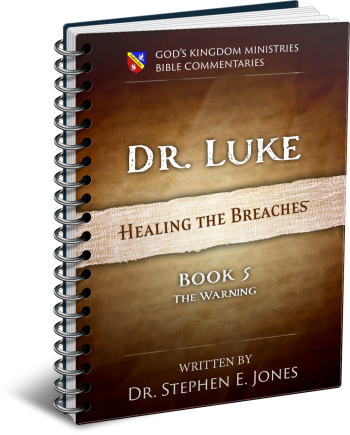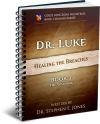Latest Posts
View the latest posts in an easy-to-read list format, with filtering options.

This is a commentary on Luke 12-14, where Jesus gives warning to Jerusalem and how to avoid divine judgment.
Category - Bible Commentaries

The man in the parable in Luke 12:16-21 did not have simple faith. Perhaps few people did in that day—or even today. Jesus goes on to describe the relationship we ought to have with God by which we may have provision each day. Luke 12:22, 23 says,
22 And He said to His disciples, “For this reason I say to you, do not worry for your life, as to what you shall eat; nor for your body, as to what you shall put on. 23 For life is more than food, and the body than clothing.”
In the earlier parable, the rich man was worried about living a good life in retirement. Though he was already rich, his lack of faith meant that he would never have enough to overcome his anxiety. But Jesus then applies the root problem to the average person. “Do not worry,” He says to His disciples. Worry is a nagging fear. It shows lack of faith.
Worry is a way of life for many people. Often they justify it by turning it into a virtue: “Well, somebody has to worry about it, otherwise nothing will get done!” The problem of worry should be resolved by prayer, even persistent prayer, until the assurance comes that God will provide. Prayer overcomes worry. Many believers know this truth in their heads, but not in their hearts. When they are faced with lack, they begin to sweat and wonder if God has somehow forgotten them.
One of the most important lessons that the Israelites had to learn in the wilderness was that God was their Provider. The only way to learn such lessons was to allow the people to face lack—most commonly the lack of water. There were times when they were ready to stone Moses. And yet, in the end, no one died of thirst or hunger. God brought them to water or provided miraculously from a rock. Further, Deut. 8:4 says,
4 Your clothing did not wear out on you, nor did your foot swell these forty years.
It appears that God tested the Israelites ten times in the first year and a half, from the time they left Egypt until the ten spies gave their report. In Num. 14:22, 23 God says,
22 Surely all the men who have seen My glory and My signs which I performed in Egypt and in the wilderness, yet have put Me to the test these ten times and have not listened to My voice, 23 shall by no means see the land which I swore to their fathers, nor shall any of those who spurned Me see it.
Worry caused the Israelites to grumble in the wilderness, something that God does not appreciate at all. Numbers 14:27 says,
27 How long shall I bear with this evil congregation who are grumbling against Me? I have heard the complaints of the sons of Israel, which they are making against Me.
This was “the church in the wilderness” (Acts 7:38). These were believers! These were the ones who had been called out of Egypt, those who had faith in the blood of the lamb through the feast of Passover. Yet they fell short of entering the Promise on account of their lack of faith. This lack of faith manifested itself in their complaints in life, which God took personally.
I have noticed in my own life that God has corrected me many times concerning this issue. For example, God led me to lease space for my office here in Minneapolis. But being at the end of the building, and having many large windows on two sides, it is expensive to heat during winter. I finally complained to the landlord. He agreed to drop the rent by $100, but then he added another $120 for a parking lot fee (to plow snow). So my complaint merely added to my overall cost. I learned a lesson from that incident.
To others, this may have been a justifiable complaint, but for me it was not. I have had many other experiences where I have had to learn not to complain when God appears to waste His resources that could have been better spent on Kingdom projects. I have had to learn that He will provide what is needed for anything that He wants to be accomplished. I have had to learn that this is HIS work, and He often spends money to train me.
God’s standard of faith is higher than most of us want to admit. He is not satisfied with faith for justification by which we are saved. He intends to increase that faith to the point where we can actually inherit the promises as overcomers.
It is a common mistake that men think that overcomers (or “saints”) are those who do great things for God. In the Roman Church, a man or woman may be elevated to sainthood if it can be proven that they did two miracles. But Jesus was more concerned about the little things in daily life that manifested simple faith. This faith is characterized chiefly by the lack of worry. So He says in Luke 12:24-26,
24 Consider the ravens, for they neither sow nor reap; and they have no storeroom nor barn; and yet God feeds them; how much more valuable you are than the birds! 25 And which of you by being anxious can add a single cubit to his life’s span? 26 If then you cannot do even a very little thing, why are you anxious about other matters?
Unlike the rich man in the parable, ravens “have no storeroom nor barn.” Yet God has provided for all creatures and has even given each a natural defense mechanism. If God has so provided for these creatures of lesser value, shall He not provide for us as well? Do we not have more value to God than ravens?
Anxiety cannot add to one’s life span. In fact, worry puts stress upon people, which depletes needed vitamins and minerals and wears down the immune system, making people susceptible to illness and accelerating the aging process. The Greek word translated “life’s span” in the NASB is helikia, which means both “length of life” and “stature.” The term is used in Luke 12:25 to convey a double meaning. We cannot worry ourselves into gaining an extra cubit of time in our life’s span, nor can we grow an extra cubit in height by worrying about it—as some children do.
We are to live a life of faith, not a life of fear. But living by faith cannot coexist with worry. Faith for justification (or salvation) should not be considered a goal but the start of a life of faith. As with the church in the wilderness, the life of faith is a journey.
Jesus continues with another example of faith in Luke 12:27, 28,
27 Consider the lilies, how they grow; they neither toil nor spin; but I tell you, even Solomon in all his glory did not clothe himself like one of these. 28 But if God so arrays the grass in the field, which is alive today and tomorrow is thrown into the furnace, how much more will He clothe you, O men of little faith!
Jesus shows that God cares for both plants and animals. He did not intend to teach us all how not to work, but how not to worry. Even the lily plant must work to grow. But it goes about its work without fear and without concern that tomorrow its flower will die.
It is also noteworthy that Jesus called His disciples “men of little faith.” He did not say that they were faithless but that their faith was “little.” This is the only time that Luke uses the term “little faith.” Matthew mentions it four times (Matt. 6:30; 8:26; 14:31; 16:8). The disciples had “little faith” when they were fearful of the storm (Matt. 8:26). Though Peter had walked on the water, he still had “little faith” when he doubted and began to sink (Matt. 14:31). The disciples even exhibited “little faith” when they were concerned when forgetting to take food with them to the other side of the lake (Matt. 16:8).
The obvious conclusion is that the size of our faith is indirectly proportional to the size of our worry and doubt in the little things. God, please make us more like ravens and lilies.
Jesus continues in Luke 12:29-32, saying,
29 And do not seek what you shall eat, and what you shall drink, and do not keep worrying. 30 For all these things the nations of the world eagerly seek; but your Father knows that you need these things. 31 But seek for His kingdom, and these things shall be added to you. 32 Do not be afraid, little flock, for your Father has chosen gladly to give you the kingdom.
Again, Jesus was not condoning laziness, nor was He telling people to stop working. God labored to make creation—and continues to work. But our work should be worry free, and when we lack something, we should know that our heavenly Father already knows what we need even before we ask. Nothing happens that escapes God’s notice.
God has often brought us down to almost nothing in the face of mounting bills to pay. We have learned that these are valuable reminders of His promise at the start of this ministry more than 20 years ago. We entered into an agreement that this was His ministry, not mine. He would be my financial manager and fund raiser, not I, so that I could focus on seeking the Kingdom and teaching the Word. And if we ever came to the place where I could not pay the bills, then I would know that it was time to find another line of work. Though we have periodically come close to being late paying the bills, God has always supplied what was needed. Through these tests, we have learned that there was no cause for alarm or worry. Many of you have been used of God to meet those needs.
Our priority is to seek the Kingdom of God. In essence, we are all employed by God, whether we are in a recognized ministry or not. We are all ministers of the gospel in some way. And as we walk out our journey, being tested in the wilderness, we know that “your Father has chosen gladly to give you the kingdom.” Our Father is not grudgingly giving us the Kingdom, but “gladly.”